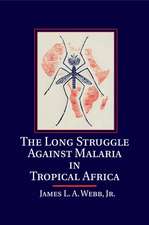Humanity's Burden: A Global History of Malaria: Studies in Environment and History
Autor James L. A. Webb, Jren Limba Engleză Paperback – 28 dec 2008
Din seria Studies in Environment and History
-
 Preț: 137.74 lei
Preț: 137.74 lei -
 Preț: 188.70 lei
Preț: 188.70 lei -
 Preț: 234.83 lei
Preț: 234.83 lei -
 Preț: 156.89 lei
Preț: 156.89 lei -
 Preț: 204.55 lei
Preț: 204.55 lei -
 Preț: 147.64 lei
Preț: 147.64 lei -
 Preț: 243.02 lei
Preț: 243.02 lei -
 Preț: 201.67 lei
Preț: 201.67 lei - 14%
 Preț: 771.56 lei
Preț: 771.56 lei -
 Preț: 231.54 lei
Preț: 231.54 lei -
 Preț: 191.12 lei
Preț: 191.12 lei -
 Preț: 239.72 lei
Preț: 239.72 lei -
 Preț: 232.16 lei
Preț: 232.16 lei -
 Preț: 200.99 lei
Preț: 200.99 lei -
 Preț: 206.52 lei
Preț: 206.52 lei -
 Preț: 199.05 lei
Preț: 199.05 lei -
 Preț: 431.15 lei
Preț: 431.15 lei -
 Preț: 322.04 lei
Preț: 322.04 lei -
 Preț: 204.48 lei
Preț: 204.48 lei -
 Preț: 299.23 lei
Preț: 299.23 lei -
 Preț: 332.81 lei
Preț: 332.81 lei -
 Preț: 239.55 lei
Preț: 239.55 lei -
 Preț: 225.79 lei
Preț: 225.79 lei -
 Preț: 285.93 lei
Preț: 285.93 lei -
 Preț: 270.25 lei
Preț: 270.25 lei -
 Preț: 275.85 lei
Preț: 275.85 lei -
 Preț: 323.05 lei
Preț: 323.05 lei -
 Preț: 208.68 lei
Preț: 208.68 lei - 11%
 Preț: 432.64 lei
Preț: 432.64 lei -
 Preț: 278.72 lei
Preț: 278.72 lei -
 Preț: 272.97 lei
Preț: 272.97 lei - 11%
 Preț: 528.82 lei
Preț: 528.82 lei - 14%
 Preț: 756.70 lei
Preț: 756.70 lei -
 Preț: 264.09 lei
Preț: 264.09 lei -
 Preț: 440.76 lei
Preț: 440.76 lei
Preț: 252.69 lei
Nou
Puncte Express: 379
Preț estimativ în valută:
48.36€ • 52.51$ • 40.62£
48.36€ • 52.51$ • 40.62£
Carte tipărită la comandă
Livrare economică 22 aprilie-06 mai
Preluare comenzi: 021 569.72.76
Specificații
ISBN-13: 9780521670128
ISBN-10: 0521670128
Pagini: 250
Ilustrații: 2 b/w illus. 8 maps
Dimensiuni: 150 x 226 x 18 mm
Greutate: 0.34 kg
Ediția:1
Editura: Cambridge University Press
Colecția Cambridge University Press
Seria Studies in Environment and History
Locul publicării:New York, United States
ISBN-10: 0521670128
Pagini: 250
Ilustrații: 2 b/w illus. 8 maps
Dimensiuni: 150 x 226 x 18 mm
Greutate: 0.34 kg
Ediția:1
Editura: Cambridge University Press
Colecția Cambridge University Press
Seria Studies in Environment and History
Locul publicării:New York, United States
Cuprins
1. Early tropical Africa; 2. Into Eurasia; 3. Into the Americas; 4. Bitter medicines; 5. Toward global public health; 6. Africa redux.
Recenzii
'No disease is more indicative of social and environmental change than malaria. Its geographical distribution and incidence have been intimately related to all fields of human endeavour, from the production of food to upheavals such as war and mass migration. James Webb's ecological history of malaria provides keen insights into this persistent affliction and into the history of humanity itself. His magisterial synthesis will be admired by historians and malariologists alike.' Mark Harrison, University of Oxford
'A lucid and stimulating account of how malaria has become the extraordinarily complex disease that it is today. The reader learns of the multitude of factors that have contributed to malaria's diversity and spread – physical ecology, population movements, war, agricultural practices, application of prophylaxis measures, availability of drugs, et al – each with its own history. Those who wish to control malaria will learn why their measures must be tailored to each situation according to how this history has played out locally, if they wish to avoid the trap of assuming that what works in one place will work elsewhere.' Socrates Litsios, Retired WHO Senior Scientist Author of The Tomorrow of Malaria
'Humanity's Burden is a remarkable effort; superbly researched, elegantly expressed, and possessed of an unstinting clarity of purpose.' The Lancet
'Humanity's Burden is testimony of a twofold success. The work offers a historico-epidemiological synthesis devoid of unnecessary technical language on a serious pathology of utmost importance in the world today. Epidemiologists, economists, anthropologists and students can draw on it with considerable benefit. It is also a very convincing essay on global history, both from inside (explaining the persistence of the virulence of the infection by studying the connections between different local epidemiologies) and from outside (integrating the advances in the social and natural science). The book is enriched by an abundant bibliography.' Medical History
'A lucid and stimulating account of how malaria has become the extraordinarily complex disease that it is today. The reader learns of the multitude of factors that have contributed to malaria's diversity and spread – physical ecology, population movements, war, agricultural practices, application of prophylaxis measures, availability of drugs, et al – each with its own history. Those who wish to control malaria will learn why their measures must be tailored to each situation according to how this history has played out locally, if they wish to avoid the trap of assuming that what works in one place will work elsewhere.' Socrates Litsios, Retired WHO Senior Scientist Author of The Tomorrow of Malaria
'Humanity's Burden is a remarkable effort; superbly researched, elegantly expressed, and possessed of an unstinting clarity of purpose.' The Lancet
'Humanity's Burden is testimony of a twofold success. The work offers a historico-epidemiological synthesis devoid of unnecessary technical language on a serious pathology of utmost importance in the world today. Epidemiologists, economists, anthropologists and students can draw on it with considerable benefit. It is also a very convincing essay on global history, both from inside (explaining the persistence of the virulence of the infection by studying the connections between different local epidemiologies) and from outside (integrating the advances in the social and natural science). The book is enriched by an abundant bibliography.' Medical History
Notă biografică
Descriere
This book provides a panoramic overview of the history of malaria from Paleolithic times up to the present.











